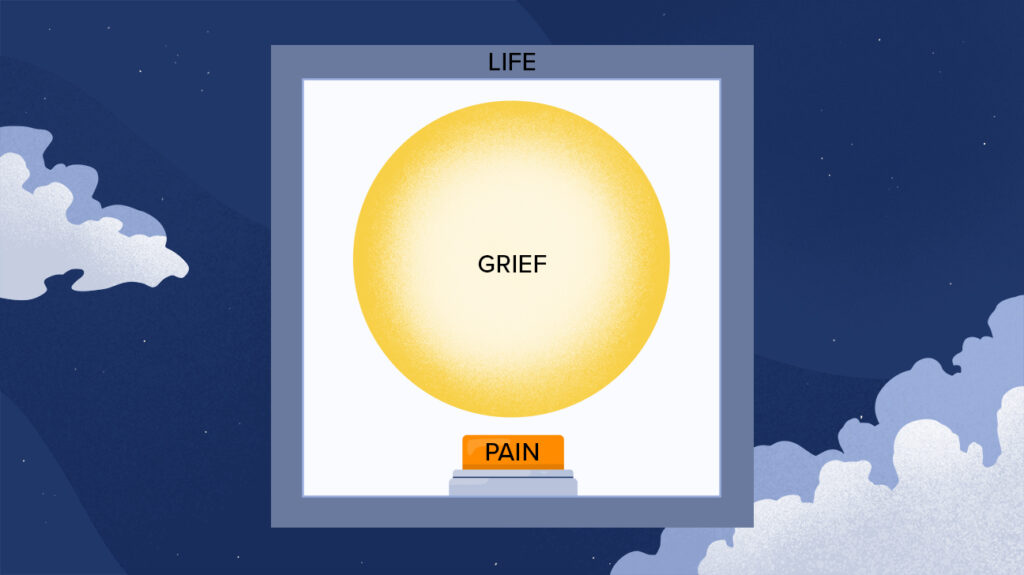As December rings in the holiday season, traditionally a time of togetherness with family and friends, many people grapple with loss and grief. Poignant reminders can surface as an empty seat at the table, a casual exchange reflecting on the year’s achievements and regrets, or an unconscious comparison to others’ beaming social media posts. With lost traditions, income, and, for some, the profound loss of a loved one, your holiday celebrations may feel more melancholy than merry. Grief is a difficult journey, and the holidays can be rocky terrain. Acknowledging your grief and creating a strategy can make navigating through the season easier.
Symptoms of grief
Whether you are grieving a change in a relationship, missed milestones like weddings or graduations, a diagnosis, or the loss of a loved one, know that every grief is valid and has a real effect emotionally, physically, and mentally.
Physical
- Weakened immune system
- Hollowness in stomach
- Loss or increase in appetite
- Headaches or migraines
- Digestion issues
- Tightness in the throat or chest
- Oversensitivity to noise
- Shortness of breath
- Lack of energy or muscle weakness
- Dry mouth
- Insomnia
- Weight gain or loss
Mental
- Inability to concentrate
- Difficulty processing information
- Feelings of unreality or detachment
- Difficulty making decisions
- Memory problems or forgetfulness
- Difficulty being present
- Disassociation, where the world seems distant and dream-like
Emotional
- Anhedonia, or loss of interest and enjoyment
- Feeling “overemotional”
- Self-consciousness
- Sadness, yearning, despair, and loneliness
- Anger or resentment, even if no one is at fault
- Guilt
- Anxiety or fear
- Shock or disbelief. Numbness or denial that it happened
The ball in the box
It can be surprising to find grief resurfaces even after you believe you’ve processed it or thought you were done mourning. The holidays, stereotypically a season of joy and togetherness, can magnify feelings of grief. The ball-in-the-box analogy can help explain how grief changes over time and how painful emotions can emerge at unexpected times.

Grief is like a ball in a box with a pain button on the side.

Right after your loss, the ball is heavy and oversized. It’s constantly present, filling every corner of your life. Every slight movement causes the ball to hit the pain button. As it rattles around, it hits the pain button repeatedly, and it feels like you can’t control it- it just keeps hurting.

As time goes on, the ball becomes smaller. It’s still ever-present in your life, and when it hits the pain button, it feels just as fresh, raw, and intense as before. But it doesn’t hit the pain button as often.

Eventually, memories, lessons, and appreciation for the deceased loved one fill the space the ball used to occupy. The ball is still there, but love and gratitude occupy more area, and the pain button is triggered less. Some people would call this acceptance. This doesn’t mean you are okay with it, and it doesn’t mean it won’t hurt when you’re confronted with the reality of your loss. Acceptance is acknowledging you can continue your life despite the pain of their absence.
Coping with grief during the holidays
Grief looks different for everyone, and while there’s no set timeline for the process, there are ways to make it more manageable. Below are a few ways to help navigate your grief process.
- Allow yourself to feel whatever you feel. Grief brings up a complex cocktail of emotions, so take time to recognize these feelings as they arise rather than pushing them aside. Whether you find joy or sadness during the holidays, accept these emotions as valid- offer yourself compassion and remember there is no wrong way to feel. You may miss the person and enjoy the holiday- these emotions can coexist. Feel sad? Cry it out. Angry? Let yourself vent.
- Lean on others. It’s unreasonable to expect you can be strong for yourself. Ask for support from your friends and family. They could bring meals, grab groceries or pick up prescriptions, offer companionship while decorating or holiday shopping, or provide company and a shoulder to lean on. When talking with your loved ones, be honest about how you’d like to approach the holidays. Let others know if it’s okay to talk about your loss, or inform them you may bow out of activities if it feels too much.
- Keep consistency. Routines offer comforting predictability when your world is upended. Be sure to eat regular meals, go to bed at the same time each night, and maintain hobbies or interests that bring you joy and connection.
- Create space to remember. Memory can be a helpful tool when coping with loss. Remember the good times and the impact they had on your life. Share memories with your family or friends, write a letter, look through old pictures, or create artwork. If you’re coping with losing a loved one, find ways to remind yourself of their presence rather than their absence. This could look like lighting a special candle at the table, making their favorite holiday meal, hanging a stocking for them, or creating a memory book.
- Pick your battles. Grief can be an isolating experience, so staying connected to your support systems is important. Choose which events you are comfortable handling and avoid canceling all your plans. While there may be pressure to attend multiple events, check in with yourself. Commit to something that sounds fun, and remember you don’t have to stay the entire time. Or you can opt out. Find a balance between connecting and not pushing yourself. Set realistic expectations. If you want to go all-out -do it. Bask in happy memories or immerse yourself in holiday movies. Focus on what is comfortable for you, and don’t look too much further ahead than that.
- Create a plan a/b. You are not obligated to please everyone. Make a backup plan ahead of time and communicate your need for flexibility. Often, anticipation can be worse than the actual event. Plan A may be attending holiday dinner with family and friends. When the time comes, and you don’t have the energy, it doesn’t feel right, or you’re just going through the motions, ensure Plan B is in place. Plan B could be spending time looking through photo albums, visiting a special place, or watching a movie that brings warm memories. Sometimes just knowing plan B is in place is enough.
- Take care of your body. Grief is as physical as it is emotional and mental. The stress hormones released during grief can lower your immune functions and leave you vulnerable to illness. Take care of your body by avoiding excessive alcohol consumption, which can intensify difficult emotions. Maintain a regular sleep schedule, drink plenty of water, and find ways to move your body each day.
- Make a difference. Try volunteering for or donating to a cause related to your loss. Helping others in a small or big way and contributing to the greater good can bring genuine joy and help take the focus off the loss.
Above all, honor your needs. If you want space for solitude and reflection, do so. If you crave connection, seek company. There is no right or wrong way to grieve. This season, be present with your loss no matter what form it takes. Remember, it’s okay to feel conflicting emotions. It’s okay to laugh, cry, or be angry. With each small step, you can acknowledge your hardship and believe in the possibility of moving forward.





